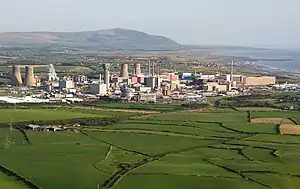Nuclear Decommissioning Authority
The Nuclear Decommissioning Authority (NDA) is a non-departmental public body of the Department for Business, Energy and Industrial Strategy, formed by the Energy Act 2004. It evolved from the Coal and Nuclear Liabilities Unit of the Department of Trade and Industry. It came into existence during late 2004, and took on its main functions on 1 April 2005. Its purpose is to deliver the decommissioning and clean-up of the UK's civil nuclear legacy in a safe and cost-effective manner, and where possible to accelerate programmes of work that reduce hazard. The NDA does not directly manage the UK's nuclear sites. It oversees the work through contracts with specially designed companies known as site licence companies. The NDA determines the overall strategy and priorities for managing decommissioning.
 | |
| Agency overview | |
|---|---|
| Formed | 1 April 2005 |
| Preceding |
|
| Jurisdiction | United Kingdom |
| Headquarters | Herdus House, Westlakes Science & Technology Park, Moor Row, Cumbria |
| Employees | 300 |
| Minister responsible | |
| Agency executives |
|
| Child agencies | |
| Website | www |
Although the NDA itself employs only 300 staff, its annual budget is £3.2 billion. The vast majority of the NDA budget is spent through contracts with site licence companies, who also subcontract to other companies which provide special services. The NDA aims to do this by introducing innovation and contractor expertise through a series of competitions similar to the model that has been used in the United States.
In April 2017, the NDA lost a legal case in the Supreme Court regarding the procurement of a sizeable contract for the decommissioning of twelve different Magnox nuclear facilities when EnergySolutions EU Ltd. (now called ATK Energy EU Ltd.) challenged a decision in connection with ATK's unsuccessful bid.[1] In February 2018 Parliament's Public Accounts Committee (PAC) concluded that the NDA had "dramatically under-estimated" costs and "completely failed" in the procurement and management of the Magnox Ltd contract, which was one of the highest value contracts let by the government. An independent inquiry into the deal was set up.[2][3]
Activities
Objectives
The main objectives of NDA are to:
- eliminate site hazards and develop waste solutions;
- ensure the highest standards in safety, security and environmental management;
- build an effective world class industry;
- gain full approval and support from stakeholders (employees, contractors, government, local communities and general public); and
- make best use of assets and maximise value-for-money.
Structure

Responsibility for operating the sites has been restructured into five site licence companies (SLCs). The management of the SLCs is contracted out to different parent body organisations (PBOs), which are owned by private companies.[4]
- Sellafield Ltd was previously BNFL's British Nuclear Group subsidiary. It comprises Sellafield nuclear chemical facility, Calder Hall and Windscale. It also previously managed the Capenhurst uranium enrichment plant, which is now owned by Urenco.[5] Its PBO was formerly Nuclear Management Partners Ltd, a consortium of URS, Amec Foster Wheeler and Areva. However, Sellafield Ltd has been under the direct control of the NDA since April 2016.
- Magnox Ltd previously two separate site licence companies)[6] It comprises Chapelcross, Hunterston A, Trawsfynydd, Wylfa and Oldbury (previously Magnox North Ltd) and Berkeley, Bradwell, Dungeness A, Hinkley Point A and Sizewell A (previously Magnox South Ltd). Its PBO was formerly Cavendish Fluor Partnership Ltd, a consortium of Babcock International and Fluor. Magnox Ltd has been a subsidiary of the NDA since September 2019.
- Dounreay Site Restoration Ltd comprises the Dounreay site. Its PBO is Cavendish Dounreay Partnership Ltd, a consortium of Babcock International, CH2M Hill and URS.
- LLW Repository Ltd comprises the Low Level Waste Repository near Drigg in Cumbria. Its PBO is UK Nuclear Waste Management Ltd, a consortium of URS, Studsvik, Areva and Serco.
- Springfields Fuels Ltd comprises the Springfields nuclear fuel production facility near Preston, Lancashire. Its PBO is Westinghouse Electric Company, a subsidiary of Toshiba.
On its creation, the NDA also took over ownership of Direct Rail Services, the rail freight operating company set up by BNFL in 1995 to transport nuclear materials.
The NDA is also the owner of International Nuclear Services, which operates services on behalf of the NDA for the management and transportation of nuclear fuels.
The NDA is also the owner of Radioactive Waste Management Ltd (RWM), which is responsible for implementing a geological disposal facility in the UK and provide radioactive waste management solutions.
In February 2017 a national archive for the UK civil nuclear industry, named Nucleus, was opened in Wick, Caithness, Scotland.[7]
Costs
| Year of estimate | Sellafield | Other NDA sites | Total |
|---|---|---|---|
| (£ billions, discounted) | |||
| 2009-10 | 25.2 | 19.9 | 45.1 |
| 2010-11 | 32.7 | 16.5 | 49.2 |
| 2011-12 | 37.2 | 15.6 | 52.9 |
| 2012-13 | 42.0 | 16.9 | 58.9 |
| 2013-14 | 47.9 | 17.0 | 64.9 |
| 2015-16 | 117.4 | 43.3 | 160.7 |
| 2017-18[10] | n/a | n/a | 234.1 |
| 2018-19[11] | n/a | n/a | 130.7 |
In 2005 the cost of decommissioning these sites was planned at £55.8 billion, with Sellafield requiring £31.5 billion.[12] However, in 2006 the NDA reported that the cost of cleaning up existing waste was higher than previously thought, and gave a new estimated decommissioning cost of about £72 billion over a 100-year period.[13] In 2008 estimated decommissioning costs increased to £73.6 billion, or after taking account of discount rates, £44.1 billion.[14] A 2006 estimate foresaw £14 billion of offsetting income from reprocessing fuel at Sellafield.[13] In 2009 the NDA sold land near three existing reactor sites for expected new nuclear power stations, for over £200 million.[15]
In 2013, a critical Public Accounts Committee report stated that the private consortium managing Sellafield has failed to reduce costs and delays. Between 2005 and 2013 the annual costs of operating Sellafield increased from £900 million to about £1.6 billion. The estimated lifetime undiscounted cost of dealing with the Sellafield site increased to £67.5 billion.[16][17][18] Bosses were forced to apologise after projected clean-up costs passed the £70 billion mark in late 2013.[19] In 2014, the undiscounted decommissioning cost estimate for Sellafield was increased to £79.1 billion,[20] and by 2015 to £117.4 billion.[9] The annual operating cost will be £2 billion in 2016.[21]
In 2018 the discount rate used in evaluating future spending was changed from a HM Treasury determined real terms discount rate to a rate that combined a nominal discount rate and an implied inflation rate based on Consumer Price Index forecasts. This nearly halved the estimate of the remaining cost of decommissioning and clean-up.[11]
National Nuclear Laboratory
In 2006, the then Secretary of State for Trade and Industry announced his support for a National Nuclear Laboratory (NNL) to be based on the British Technology Centre at Sellafield and Nexia Solutions.[22] The NDA, as the owner of Sellafield site and the funder of majority of research required across the nuclear estate, was involved establishing the NNL in 2009. The NNL complements other initiatives to develop a sustainable workforce such as the National Skills Academy for Nuclear (NSAN) network, including the development of Energus in West Cumbria, alongside complementary research and development facilities such as the Dalton Nuclear Institute.
References
- Press Summary: Nuclear Decommissioning Authority (Appellant) v EnergySolutions EU Ltd (now called ATK Energy EU Ltd) (Respondent) [2017] UKSC 34 on appeal from: [2015] EWCA Civ 1262, 11 April 2017
- "NDA to take over management of Magnox sites". World Nuclear News. 3 July 2018. Retrieved 9 July 2018.
- "The Nuclear Decommissioning Authority's Magnox contract". Public Accounts Committee. UK Parliament. 27 February 2018. Retrieved 9 July 2018.
- NDA Confirms Names of New Site Licence Companies, Nuclear Decommissioning Authority (14 February 2007)
- "Urenco takes on Capenhurst site". World Nuclear News. 30 November 2012. Retrieved 2012-12-13.
- Magnox Limited Archived 2012-04-02 at the Wayback Machine, manages ten Magnox nuclear power stations and the Harwell and Winfrith facilities. Magnox Sites (11 January 2011)
- "National archive for nuclear industry opens in Wick". BBC News. 14 February 2017. Retrieved 16 February 2017.
- Nuclear Decommissioning Authority - Progress on the Sellafield site: an update (PDF) (Report). National Audit Office. March 2015. Retrieved 16 March 2015.
- "Nuclear Provision: the cost of cleaning up Britain's historic nuclear sites". NDA. 1 September 2016. Retrieved 26 February 2017.
- The Nuclear Decommissioning Authority: progress with reducing risk at Sellafield (PDF) (Report). National Audit Office. 20 June 2018. p. 27. ISBN 9781786042019. Retrieved 10 July 2018.
The discounted provision has more than tripled since 2015, increasing from £73 billion in 2015 to £234 billion, due to changes in HM Treasury’s discount rates.
- Annual Report & Accounts 2018/19 (PDF) (Report). NDA. 4 July 2019. pp. 84, 104, 163. HC 2425. Retrieved 25 April 2020.
- NDA Strategy - draft for consultation (PDF) (Report). Nuclear Decommissioning Authority. 2005. p. 66. Archived from the original (PDF) on 22 November 2009. Retrieved 7 December 2013.
- "Nuclear clean-up 'to cost £70bn'". BBC News. 30 March 2006. Retrieved 2010-05-22.
- "Annual Report & Accounts 2007/08". Nuclear Decommissioning Authority. Retrieved 2010-05-22.
- Danny Fortson and Dominic O’Connell (29 March 2009). "Prices soar as bidders fight for nuclear sites". The Sunday Times. Retrieved 2010-05-22.
- "Sellafield clean-up cost reaches 67.5bn, says report". BBC. 4 February 2013. Retrieved 19 February 2013.
- Terry Macalister (4 February 2013). "Sellafield management sharply criticised by Commons committee". The Guardian. Retrieved 19 February 2013.
- Nuclear Decommissioning Authority: Managing risk at Sellafield (PDF). Committee of Public Accounts (Report). House of Commons. 23 January 2013. Retrieved 19 February 2013.
- Macalister, Terry (4 December 2013). "Sellafield bosses forced to say sorry over £70bn-plus cleanup costs". theguardian.com. Retrieved 5 December 2013.
- Gosden, Emily (23 June 2014). "Britain's nuclear clean-up bill soars to £110bn". The Telegraph. Retrieved 13 January 2015.
- "UK decommissioning agency lays out plans to 2019". World Nuclear News. 6 January 2016. Retrieved 26 February 2017.
- Alistair Darling announces the formation of the National Nuclear Laboratory Archived 2008-12-13 at the Wayback Machine, Nuclear Decommissioning Authority (30/06/06).